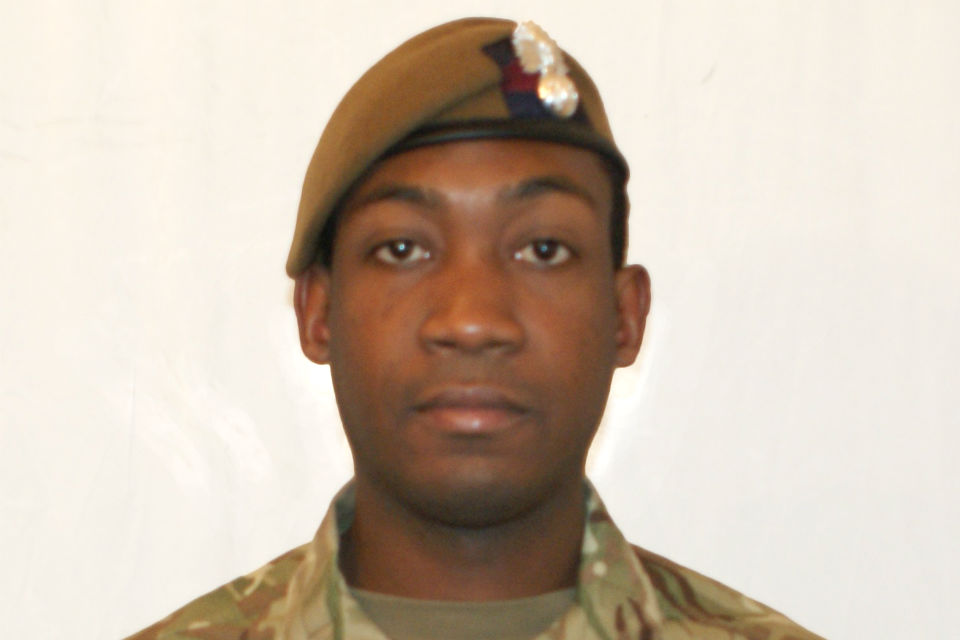
I always had an interest in the Armed Forces and was in the Air Cadets for most of my teens. I didn’t give it a great deal of thought, but that interest never really disappeared. I’m unashamedly patriotic and I love being a civil servant. However, as much as I enjoy my job, I always felt that there was something more that I could give, something more I wanted to experience and something more that I wanted to get back.
Someone at work mentioned the Reserve Forces, and I thought I would find out a bit more about it. Between then and actually enlisting as a soldier in the Army Reserve, I was always driven by wanting to find out a bit more. The more I saw, the more I liked it and the deeper I allowed myself to get stuck in. I’ve never looked back!
Of course, being a Reservist is a commitment. You do a lot of training in your free time and so you make a sacrifice. But this is all made substantially easier by having an extra 15 days paid leave for training, so that I can do courses mid-week with no detriment to my career (or annual leave entitlement!).
My department was and is extremely supportive of my decision from the Permanent Secretary actively promoting the Reserves, to line managers pushing me to pack up on time so I’m not late for drill nights.
I work in policy at the Treasury. The nature of my job requires me to be a quick learner, a good communicator and make clear decisions. I’m currently training with a view, ultimately, to being a Surveillance and Target Acquisition Patrol Trooper. Although the physical requirements are a great deal tougher, I find that I have to apply the same mental agility I need in my day job when I’m in the field on exercises. The external pressures when on an exercise test mean that I develop these skills faster than is possible in the office though!

My HMT and Reserve roles essentially support and develop each other. You can never undersell the ‘soft’ skills developed in the Reserves, especially the self-confidence that comes with being put in the thick of it, remembering your training and delivering what’s required.
One of the striking things about being a Reservist is the amount of time dedicated to your development. I spend about 5% of my day job training, but about 95% of my time as a Reservist. It ultimately rubs off on everything I do, including my day job and personal life. I find myself better organised, more confident, more driven and reaping the benefits of becoming a natural planner.
I recommend being a Reservist to anyone who is interested. I’m fortunate enough to now be the Treasury’s Reserves Champion, which gives me a great platform to do this.
To find out more about how you and your team can benefit from Reserves service, come along to The Reserves Experience at the Birmingham Council House, 1 Victoria Square, Birmingham B1 1BB.
Register for a ticket to the Birmingham event now.
The Reserves Experience will be visiting other regions later in the year.

4 comments
Comment by Dave posted on
Rob is not talking from experience and there are some really dubious statements within his comment.
Anyone that joins the armed forces, is aware that they will be armed and therefore may potentially be required to use a weapon. It's rather obvious. They also realise they may be deployed in situations where their lives may be in danger. They are however well trained and equipped and medical support is better than ever, in fact many lessons from operations are now benefiting civilian medical practice.
There are many support roles in the reserves that are not 'front-line' and the majority of reservists may well never fire a weapon in anger.
All reserves get mobilisation briefs so they understand the commitment, risks and their rights including right to appeal on mobilisation.
If you join the reserves, as with the regulars, you do so realising you are likely to serve your country at some point and that is a key driver for many people who join the reserves. Whether you personally agree with the reasons for any particular campaign is not relevant, but there is usually a degree of choice whether to volunteer for particular operations.
I don't believe there are any negative aspects to reserves service and whilst Rob is entitled to express his opinion, he is doing so because regular and reserve forces have fought on behalf of the people of this country to maintain that freedom of speech.
I've served in the reserves for almost 20 years and almost without exception, my reservist colleagues are extremely committed and engaged, often more so than with their day jobs!
I'd highly recommend people consider the opportunities available to them in the Reserves. The Reserves Experience provides people with the chance to do exactly that, but from a position based on knowledge rather than myth.
Comment by GB posted on
Alternatively you could think of the many thousands of lives saved by the intervention of the UK Armed Forces in places like Iraq and Afghanistan.
Comment by Simon posted on
What ever opinions one has as to the merits (or Not ) of the Armed yes armed services the fact is we live in a democrecy wher we can express these views .
Unless you have experienced the oppressive and somewhat hostile evnviroments of liveing as a minority in a socity where extreem views and actions are the normality then critisiem of our rights to fredom are maybe incorect
Comment by Rob Davies posted on
Clearly Aaron has gained a great deal personally as a Reservist, and no doubt much of what he has learnt is of value in his Civil Service work. However I wish to say out that no negative aspects of life as a Reservist have been pointed out.
As a lifelong and committed pacifist I urge anyone contemplating joining the Reserves to consider the following:
1. You may have to kill someone or seriously injure them. At the very least you will be supporting people who do that. Aaron provides no explanation of what a “Surveillance and Target Acquisition Patrol Trooper” means, but it does suggest that the role falls into this category.
2. You may be killed or suffer a life changing injury, or suffer from post traumatic stress disorder. There has been a significant lack of resource given by the state to assist those brave people who have been sacrificed to further the interests of the state. If this were not so then there would be little need for the sterling work done by such charities as “Help for Heroes”.
3. If you are mobilised I don’t think that you could drop out of the mission if you disagreed with the action which the Army had been instructed to take by its political masters.
4. The legacy of the Army’s involvement in Iraq and Afghanistan, and the loss of life suffered both by the Army itself and many thousands more non-combatant civilians are abhorrent to me and many others.
5. As the Regular Army contracts and the Army Reserve expands, you are likelier to be mobilised. Should the Government commit £100 billion or so at this time of austerity to renewing the ultimate Weapon of Mass Destruction which is Trident, then there will be less money for the Regular Army.
6. I am very grateful that the Army is involved in humanitarian missions, disaster relief and peacekeeping (though there is the caveat of “mission creep”). However as far as I know a Reservist couldn’t apply to be a Reservist for those roles alone.
As we contemplate the centenary of the ultimate folly that was the Great War I feel that our efforts should be directed towards peaceful ends. By all means let us have the capacity to be able to defend ourselves. Sadly recent history teaches us that the Army has been used as a political tool for offence rather than defence, and its foreign adventures have contributed to the rise in terrorism, which has made the lives of all of us feel less safe. There is no doubting the dedication and courage of the typical soldier, but I fear that those qualities have been cynically used to foster geopolitical ends.
The Government White Paper "Reserves in the Future Forces 2020 - Valuable and Valued" tells us that the aim is to increase the reserve from the current 29,291 to 34,900. I also learn that a reservist may be called up for "up to 1 year in 5". It is also the case that reservists will be expected to perform exactly the same tasks as regular soldiers. From a cursory inspection of the website there appears to be little reference to after care of personnel after leaving the Armed Forces. It is well known that the prisons hold a high number of former soldiers. Many former soldiers suffer from post traumatic stress, which can result in dysfynctional lifestyles, depression, violence and suicide
So if you are thinking of joining, do your homework first, and reflect on the thousands of deaths (mainly civilian) which armed intervention by UK forces have caused in the recent past. And consider whose interests you are actually serving. Is it the State? Or is it the vested interests in oil and armaments?
My comments are in no way a criticism of Aaron as an individual, or a disparagement of his achievements. However I do have an issue that there are negative aspects to the Reserves which I feel have not been pointed out.
It seems that there is a Civil Service wide drive to encourage people to join the Reserves. In my agency APHA we have had two similarly positive reports by Reservists since the summer. Could this be related to the disappointing number of 20 recruits which I learn from the press have been recruited despite a £2 million campaign? In the report which I read the Shadow Defence Secretary Vernon Coaker is quoted as saying that the figure is "shocking" and that "It's clear that these plans are failing". Is this why the "Reserves Experience" series of events is being held
Should any of you choose to attend the "Reserves Experience" then please consider thepoints which I have raised and seek answers from the people running the event.